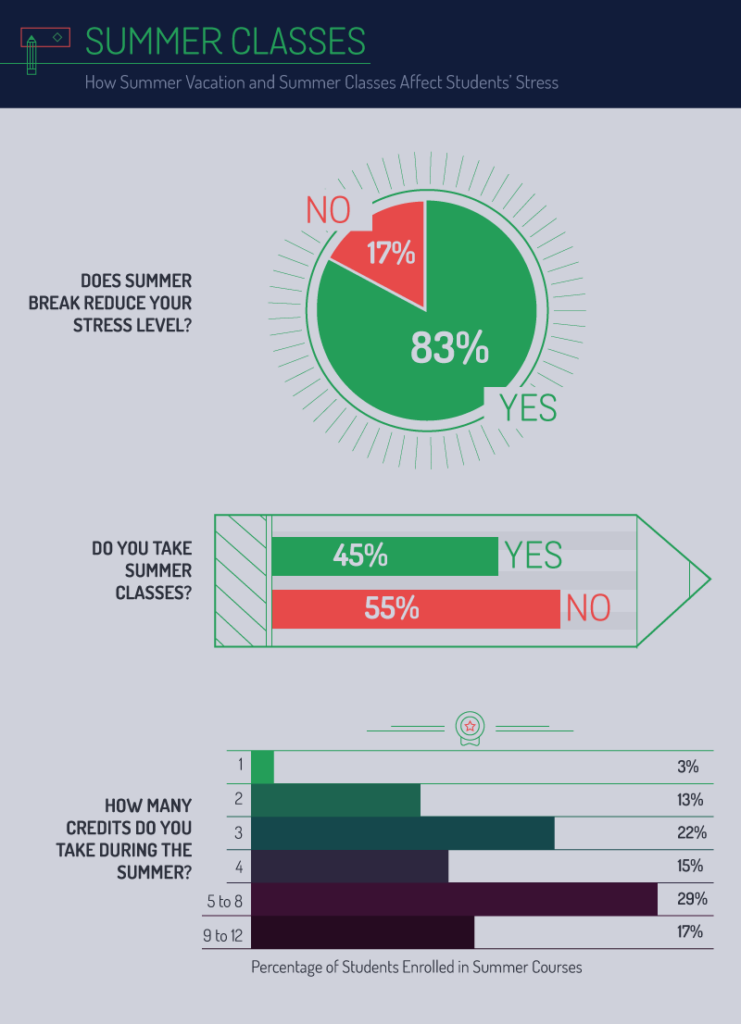Mental Health in College
- Self-Reported Causes of College Students’ Stress
- Additional Causes of Students’ Stress
- Stress Surrounding Final Exams, by State
- Frequency of Students’ Stress Throughout the Semester
- Experiences of Sleep and Sleep Deprivation on Campus
- Summer Vacation, Summer Classes, and Student Stress
- Help is Available for Students’ Mental Health Struggles
- Methodology

Mental health awareness is growing on college campuses. As the stigma of mental health conditions has begun to decline, more and more students are taking steps to seek out counseling and other psychological services at their schools, revealing the true extent of these troubling issues.
Depression is a long-standing and serious issue among many college students; however, it has been eclipsed in recent years by anxiety. As of 2015, almost 58 percent of college students reported that they had experienced “overwhelming anxiety” within the past 12 months. These debilitating struggles can have a serious impact on students’ lives, with many dropping out of school or worse – committing suicide.
The college environment can be a tumultuous time for young adults, and today’s students are subject to many social factors that can affect their stress levels, their vulnerability to mental health difficulties, and the severity of these conditions. So, what are the main causes of these students’ struggles? We decided to find out.
In a survey of over 1,000 college students, we asked for perspectives on the most significant sources of their stresses. We also looked at tweets originating from four-year universities with 1,000 or more students and searched for keywords related to mental health and stress. From there, we analyzed which concerns are the most frequent for these students and which aspects of the college experience have caused them the most distress. Read on to find out what’s having the greatest impact on the mental well-being of college students today.
Self-Reported Causes of College Students’ Stress

One of the questions we asked college students: what is your biggest source of stress? Overall, 31 percent of students reported that midterms and final exams are their most significant cause of stress. Anxiety surrounding testing is a serious issue for college students, as worrying about their performance on the test itself can distract students from focusing on schoolwork and studying, which can negatively affect their exam grades.
Additionally, 24 percent stated that graduation, and their job prospects after college, were their most stressful concern. Many college students now find themselves having to make difficult choices about the fields of study that most interest them and those that they feel are most likely to lead to a well-paying career.
Repaying steep tuition fees after graduating also worried students. Another 23 percent of students reported that classes and their workload were their biggest cause of stress, while 13 percent said homework was the source of the most stress for them. Family and friends were least frequently (2 percent) the primary source of stress for students.
We also found small differences between what male and female college students consider to be their biggest causes of stress. While midterms and finals were the greatest source of concern for men (34 percent), classes and workload took first for women (28 percent). Only 20 percent of men said classes and workload were their biggest source of stress, and only 26 percent of women said midterms and final exams were their foremost concern. Overall, women in college have typically been found to experience lower levels of stress than men.
Additional Causes of Students’ Stress

In our survey, we also asked students to detail other specific sources of the stress they’ve experienced in higher education. Overall, the most frequently mentioned concern was school itself, suggesting that their studies were one of the largest sources of everyday stress. Students also reported that balancing the various responsibilities of college was another major concern as well as a combination of factors, which were not expanded on by the students. Academic concerns such as their grades, thesis, and class load were likewise mentioned often. Fiscal anxieties made a strong showing as well, with issues such as finances, tuition, a job, rent, and student loans frequently appearing.
Stress Surrounding Final Exams, by State

Next, we examined tweets from college campuses mentioning keywords related to final exams in order to determine which states had the most students discussing these concerns on Twitter. The state of New York showed the highest rate of such tweets. Home to many Prestigious Institutions such as Cornell, Columbia, Vassar, and Rensselaer Polytechnic Institute, it may be that these students are tweeting about the pressures of their rigorous curriculums, combined with living in a fast paced city.
California placed second in the country for college students’ tweets about finals, although at a rate of less than a quarter of New York’s. At renowned California universities like Stanford, Berkeley, and Cal Poly San Luis Obispo students may face a heightened pressure to perform well on exams.
Massachusetts placed a close third for concerned tweets about finals, while Illinois and Pennsylvania tied for fourth place. Meanwhile, Vermont, New Hampshire, and Maine tied for last place for students’ tweets on finals – each of these states showed more than 500 times fewer tweets-of-concern than New York.
Frequency of Students’ Stress Throughout the Semester

We then asked college students how often they experience feelings of stress during a given semester. About 31 percent of the students we polled said that they feel stressed two to four times every semester, yet a remarkable 30 percent said that they experienced stress almost constantly throughout the entire semester. Such disturbingly high levels of stress are reflected by other studies of college students’ mental health – nearly 44 percent of men and 62 percent of women reported feeling “overwhelmed by all [they] had to do” within the past two weeks.
A further 28 percent of students we surveyed said they experience stress five to seven times each semester, while 9.1% reported being stressed only about once a semester. Altogether, stress in college appears to be especially frequent – a mere 2 percent of students said that they never experience stress throughout the semester.
Experiences of Sleep and Sleep Deprivation on Campus

Getting enough sleep can prove difficult for many college students. According to the University of Georgia, students typically get about six to seven hours of sleep each night. The many activities and responsibilities associated with college life can contribute to sleep deprivation. As a result, about half of students suffer from daytime sleepiness, which can severely impact their learning and academic performance.
We looked at tweets from campuses which contained keywords relating to sleep deprivation, such as “no sleep,” to find out which states were host to the highest frequency of such tweets. Similar to our discoveries on concerns about final exams, New York state showed the most tweets from college campuses about sleep-related terms. Second-place California had fewer than one-third as many such tweets, while Pennsylvania ranked third.
At the other end, Maine was firmly in last place for campus tweets about sleep, while Idaho, North Dakota, and Nebraska tied for second-to-last place.
Summer Vacation, Summer Classes, and Student Stress

The availability of summer courses provides students with a flexible option for planning and pacing their academic progress. Attending summer classes is associated with a greater likelihood of completing a degree program. While college students may benefit from this accelerated schedule of coursework, others find that they enjoy the relaxation that comes with a summer break. We asked college students how they feel about summer and its effects on their stress levels, as well as whether they choose to take additional courses during this time.
An overwhelming 83 percent of students surveyed believed that taking a summer break helps to reduce their stress levels. However, far fewer students chose to take advantage of this break: 55 percent reported that they did not take summer courses.
Among those who do attend summer classes, many take on a heavy course load – 29 percent reported taking five to eight credits, 22 percent took three credits, and 17 percent took nine to 12 credits.
Even as a great deal of students feel that a break from coursework would have a positive effect on their stress levels, many nevertheless choose to take on extensive academic obligations during that time instead.
Help is Available for Students’ Mental Health Struggles
For many reasons, college can be a particularly stressful and difficult time for young adults. Many students find themselves living away from home in a very new environment full of unfamiliar people and new responsibilities, facing the burden of learning to manage their academic life, personal life, and social life successfully.
As we’ve seen, stress is a frequent and understandable reaction to the various and complex concerns that must be balanced by students. However, when this stress becomes a consistent and debilitating pattern of depression, anxiety, or thoughts of self-harm, it’s important to seek help.
Methodology
We surveyed over 1,000 college students to learn more about what causes their stress. For all percentages, we rounded up to the nearest whole number. In addition, we incorporated Twitter data to look at what students were talking about finals and no sleep.
Starting with a data set of over 11 million tweets, we focused in on public and private, not-for-profit, four-year universities with at least 1,000 undergraduate students. This left us with more than 2.9 million tweets for analysis. We looked at tweets coming from within one mile of a college campus center with 1,000 to 4,999 full-time students and within three miles of a college campus center with over 5,000 full-time students.
We looked for terms such as “exams,” “finals,” “all nighter,” “no sleep,” and “exhausted” to find out what the students were tweeting about.
Fair Use Statement
We grant permission to share the images and research found on this page freely. When doing so, we ask that you kindly attribute the creators by providing your readers with a link back to this page so they may read more about the project and any related research.
- http://www.pbs.org/newshour/bb/stress-less-stigma-drives-college-students-mental-health-services/
- http://www.acha-ncha.org/docs/NCHA-II%20FALL%202015%20REFERENCE%20GROUP%20EXECUTIVE%20SUMMARY.pdf
- http://www.apa.org/monitor/2014/09/cover-pressure.aspx
- http://files.eric.ed.gov/fulltext/EJ1053811.pdf
- http://www.silive.com/specialreports/index.ssf/2015/01/passion_or_paycheck_todays_stu.html
- http://papers.ssrn.com/sol3/papers.cfm?abstract_id=2653968
- https://colleges.niche.com/rankings/best-colleges/s/new-york/
- http://www.4icu.org/us/california/
- https://www.uhs.uga.edu/sleep/
- http://www.ncbi.nlm.nih.gov/pmc/articles/PMC4075951/
- https://www.ccaurora.edu/use-summer-semester
- http://nces.ed.gov/ipeds/
The content on this page was originally from MentalHelp.net, a website we acquired and moved to MentalHealth.com. This content has not yet been fully updated to meet our content standards and may be incomplete. We are committed to editing, enhancing, and medically reviewing all content by December 31, 2025.
We are a health technology company that guides people toward self-understanding and connection. The platform provides reliable resources, accessible services, and nurturing communities. Its purpose is to educate, support, and empower people in their pursuit of well-being.
We take mental health content seriously and follow industry-leading guidelines to ensure our users access the highest quality information. All editorial decisions for published content are made by the MentalHealth.com Editorial Team, with guidance from our Clinical Affairs Team.
Further Reading
The content on this page was originally from MentalHelp.net, a website we acquired and moved to MentalHealth.com. This content has not yet been fully updated to meet our content standards and may be incomplete. We are committed to editing, enhancing, and medically reviewing all content by December 31, 2025.
We are a health technology company that guides people toward self-understanding and connection. The platform provides reliable resources, accessible services, and nurturing communities. Its purpose is to educate, support, and empower people in their pursuit of well-being.